Meet Eric Swalwell, Your (Next) Favorite 2020 Democratic Presidential Candidate
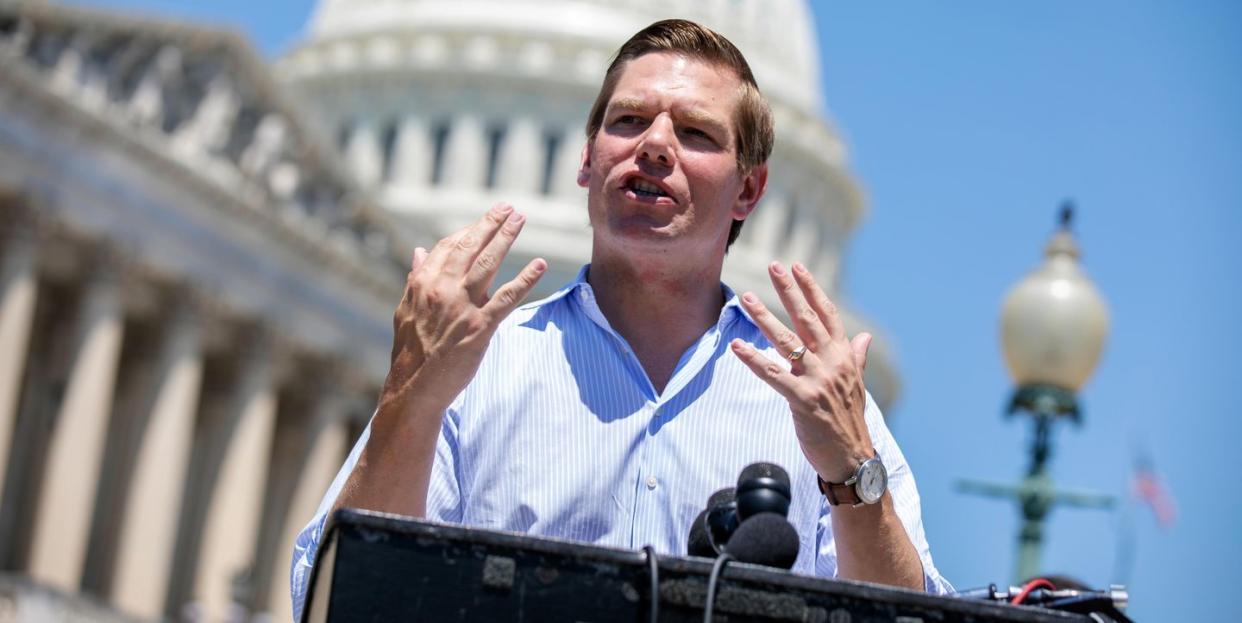
On Monday, Rep. Eric Swalwell became the latest Democrat to declare he’s running for president. Swalwell, a 38-year-old congressman from northern California and member of the House Intelligence Committee, is well-known to cable news junkies for his frequent appearances over the last two years discussing Trump and Russia. Off-camera, he has been bouncing between Iowa and New Hampshire for months. He made things official this afternoon during a taping of The Late Show with Stephen Colbert, which will air tonight. We spoke recently during two long interviews as Swalwell prepared for today’s announcement. What follows is an edited and condensed version of our conversations.
Ryan Lizza: Where will you find yourself ideologically within this large group of candidates?
Eric Swalell:I'm going to be an aspirational candidate who believes that in our lifetime we could have 100 percent renewables when it comes to energy; that in our lifetime we could have publicly financed campaigns; that in our lifetime we could buy back and ban every single assault weapon. So I want to challenge the country to go big, be bold, and do good. I think that there's just a boldness that's missing right now and I think I can make the case as someone who has lived the life. I've seen hard work add up to something. Generationally, I’m still very optimistic [but] experienced enough to know how to get things done in Washington.
Is there any one issue that you think you push for or be more known for than the other candidates?
Gun violence. I will be the first candidate to say that reducing gun violence has to be a top three issue. Last year I wrote a bill calling for a buy back and ban on assault weapons-not just to ban future manufacturing, but to just take the 15 million that are out there and buy them back. And do what Australia did, do what New Zealand did. They've shown us-Australia in the 90s, New Zealand just this week-that courage in doing the right thing can protect people. And I'm inspired by this next generation, who lifted themselves up out of this Parkland tragedy and went to the town squares and the town halls and marched on the ballot box and took out a number of NRA endorsed candidates [in the 2018 midterms].
I've seen that when I go across the country. The NRA-they are a paper tiger. They have us in fear that [if you support] any limitation on firearms, you would be in a position that the overwhelming majority of the country is against you. And I've just come to find out that's not the case at all.
Your candidacy will be greeted with a lot of skepticism-about fundraising, about polling, about your ability to get into the debates. When we talked recently you joked a little bit about convincing your wife about doing this. How did you convince her?
We talk about a single moment a lot, which was when we went to her 40-week appointment when we had our son, back in 2017, and the doctor was a little surprised to see me at the appointment because she figured I'd missed most of the earlier appointments and probably wasn't going to be around for the last one. And my wife told the doctor really excitedly, “Oh, yeah, he's going to be around all week for the birth of our son. He's going to be missing votes.” And the doctor, she looked at the both of us and she said, "You're going to miss votes?" And I was like, “Yeah, of course, I'm not going to miss the birth of my son!” And the doctor looked at my wife and she said, "Well aren't they possibly voting to repeal the Affordable Care Act this week?" This is when the ACA repeal was happening in the spring of 2017. And I said, “That's a chance, that's a risk. It could come back from the Senate and we could have another vote, but I'm not missing the birth of my son.” And the doctor looked at me and looked at my wife and she said, "How about I make a deal with you guys? You do your job, I'll do mine. You go back there, don't let them take healthcare away from my patients, I'll see your wife every single day and make sure that you don't miss the birth of your son."
My wife didn't want me to miss the vote. I went back to Washington, came back, made the birth within three hours. And I remind my wife of that and she reminds me of that: that she was willing to sacrifice me missing our son's birth then because she saw from a doctor who cared a lot about her patients what was on the line, and this is a big sacrifice for our family now, but we think there's a lot on the line and we think that we could help. [Editor's note: The couple also has a daughter, who was born last fall.]
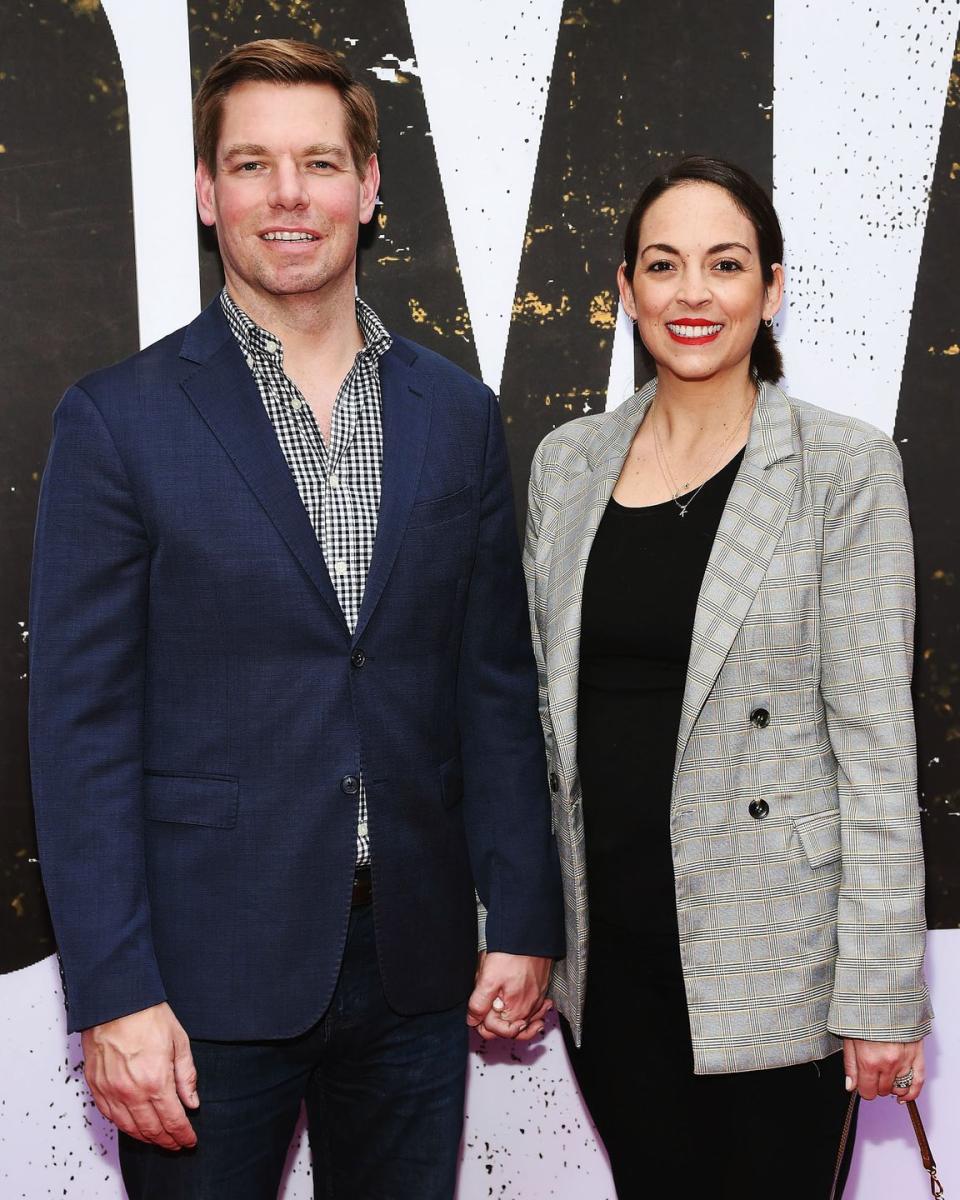
One of the ways that a lot of candidates have started this race is by apologizing for things that they regret. What are you sorry for?
Well I think you should apologize if you're wrong, not if you've said something that's unpopular, and so it's important to show empathy and that's why it's so maddening that we have a President who doesn't apologize for anything. So I, from time to time, particularly on social media, I've sent out tweets that, you know, I don't think show the best of me. During the Kavanaugh confirmation I was very passionate about making sure Dr. Ford was believed. Senator Collins had said that her office was being inundated with threats of violence. She was being threatened and I very snidely tweeted back that, well, Dr. Ford can't even sleep in her own bed. Boo hoo hoo. And I'm sorry I said that. That's not who I am. I've never even used that phrase before. I will apologize if I say something that is insensitive or just flat-out wrong to say. So I wish I had not done that during that very emotional period of time for our country.
You were a prosecutor for seven years in Alameda County, California, and you once mentioned to me that there was a certain ideology instilled in young lawyers in that office. What was it?
You were told on Day One that this was an office that [future chief justice] Earl Warren presided over and there was a lot of pride in that because of the reforms he put in place to clean up corruption in the county, to make sure prosecutors were not seeking just wins in a case but justice. And so the mantra in the office was: this isn't about wins and losses. It's about doing justice. And so that kind of liberated you to do the right thing and not feel like you'd be judged by your colleagues if you dismissed a case because you didn't believe you could prove it or if there was a lot of pressure to win a case at all costs. When it came to showing mercy for people who deserved it, you were given the ability to do that because of the history in the office.
Is it true that your parents and three brothers are all Republicans who voted for Trump?
My mom and dad are Republicans. At least two of my brothers are. I think one of my brothers is an independent now. My parents are on, like, the Republican National Committee mailing list and a year ago they bought a Trump-Pence refrigerator magnet that is still on their fridge. I hope that comes down soon. And then I married a Hoosier from southern Indiana and she grew up literally in the hometown with Pence. Her grandfather was a pallbearer at Mike Pence's father's funeral. So I'm around a lot of Republicans.
Is it true that you decided, in 2012, to run in the primary against Democratic Congressman Pete Stark, who was 81 years old then and had served for 20 terms, because he canceled a meeting with you?
[Laughs.] It was a canceled meeting where I saw that we didn't have an active, engaged member of Congress who understood the changing economy of the time. I was a city councilman [from Dublin, California]. I've come back to Washington, D.C. I go to his office, it's a voting day. And his staff, brings me into his office. I sit on his nice leather couch, and they tell me that he's at home in Annapolis and that he would be calling into the meeting. And I just remember hearing, like, the House bells going off because votes were going on that day. And I thought, “What is he doing at home? There's work to be done, you know, here on Capitol Hill."
I talked to him sitting on his couch and then went back home and started to give some thought about our area, our needs and I did make the decision shortly thereafter to run a new energy, new ideas candidacy against him.
So this leads to the obvious follow-up: what did Bernie Sanders or Beto O’Rourke or Kamala Harris do to piss you off?
[Laughs.] As a 20-year old intern on Capitol Hill who was intimidated by the biographies of congressmen, I never imagined I would have so many friends in a presidential primary field. I found a great picture in my phone from our new member orientation when we were members-elect. We were up at Harvard for the new member orientation and sitting in the dugout of Fenway Park because we had done like a bonding tour. And it’s me, Tulsi [Gabbard, senator from Hawaii], and Beto sitting together-just the three of us. And I thought, boy, who would have thought in that moment that all three of us, who had kind of not taken a straight line to Congress, and seven years later would be in the same primary together.
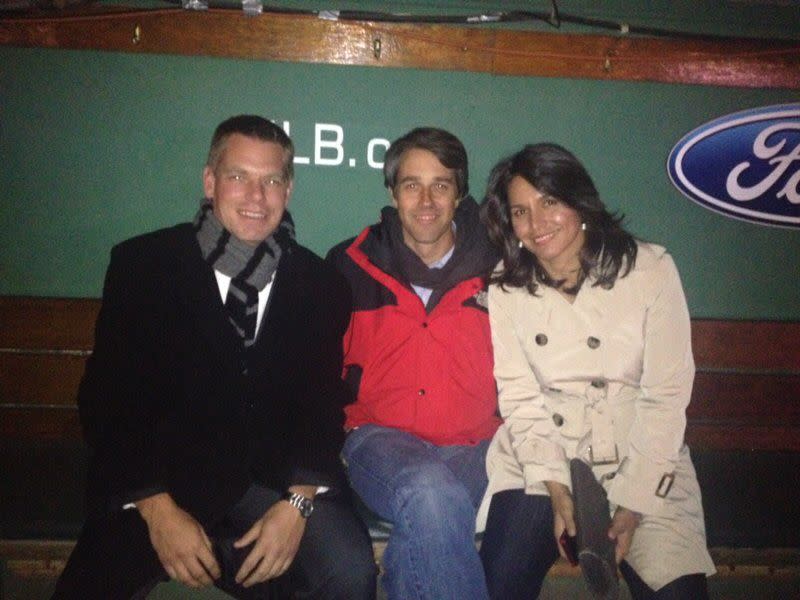
During your race against Congressman Stark he called you a "pipsqueak," a "slime ball," and a "fucking crook." Did you guys ever reconcile after you beat him?
No, I've not seen him. We both represented-he represented and I represent-the same area and so I hope one day if we did cross paths we could talk about that. I hold no hard feelings and honor his service to the country. I just believe and still believe that our area needed someone that was gonna bring new energy, new ideas, and a new confidence to the Congress, and that's why I ran.
If you were the Democratic nominee, and you were on a debate stage with Donald Trump, what are some of the questions that you are dying to confront him with?
I would ask him, how is the average American who's not invested in the stock market, who is living paycheck to paycheck, better off since you were elected? I think that’s ultimately what this election will be about.
Not something about Russia? Do you worry that your public image is so tied to the Russia investigation that that's something you need to correct as you enter the race?
As the country gets to know me more, they will see the reason I care so much about Russia is I understand why they thought to help Donald Trump. And it wasn't only to get a transactional benefit of reduced sanctions, a diminished role of NATO, and pulling out of Syria. It was to tear down the promise of America, which is that no matter who you are, who you love, who you worship, what your parents did, if you work hard, you can be anything. And if that promise is true in our young country, it could be true in Russia. And the best way to keep it from coming to Russia is to beat it at its origin. And so because I'm someone who benefited from seeing my parents have that promise fulfilled, I care a lot about a country trying to interfere in our election, turn us against each other, and have us on an equivalent plane with their oligarchy system.
I don't want that. I want us to be a country of free ideas, free markets, and a freedom to dream.
What are the lessons you’ve learned from how Clinton and Obama, the last two Democratic presidents, governed?
Clinton brought pragmatism and collaborative spirit to Washington and I think he was regarded as able to strike deals, work with Republicans, and get things done. It wasn't always pretty, but he was effective at working with Congress. And I've heard that from my colleagues who were here when he was President and I know that from coming of age during that era.
President Obama just brought unseen integrity to the office. He's such a man of character, had eight years without any serious scandal, not only of his making but the people he'd hired around him. During the Russia investigation, one day we had Sally Yates before our committee and the next day, we would have Roger Stone. And you got to see just the contrast between who President Obama had around him and who Donald Trump as a candidate and still today as an advisor has around him. And so the character and the quality of people he brought into government is something that I admire and would want to emulate.
If I were to pull up your top 25 most played list on your iPhone, what do you think would be on it?
I'm a country music Democrat, that's for sure.
Like in a real way or like a fake way because you're running for president?
No, no, no, no. Ask anyone who knows me. I picked that up in law school [University of Maryland, Baltimore] from my law school roommate. We would drive to class and he was just the biggest country music fan and turned me on to it. Started with Tim McGraw and Billy Currington and went from there.
Do you go to country music shows?
Oh yeah.
What's the last country music show you went to?
Darius Rucker in August, in California. And I also went to see Taylor Swift when she was here in Washington, like, you know, unapologetically. I won't apologize for that.
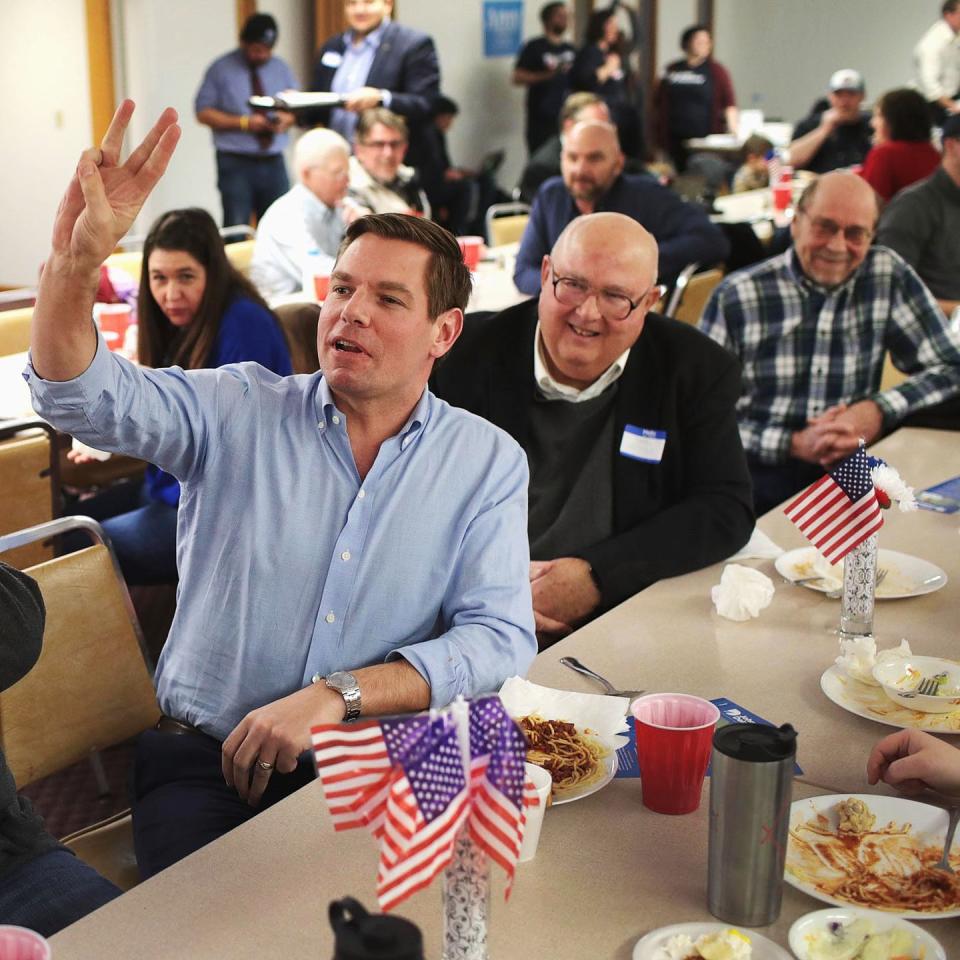
What’s a book you’ve read recently that affected your thinking about policy?
I just read The Hell of Good Intentions [by Stephen M. Walt], which is about U.S. foreign policy over the last ten years and some of the mistakes we've made and the rise of authoritative governments in the world. That there are more and more authoritative government coming to be than democracies.
What's a takeaway from Walt's book that perhaps you didn't think of before you read it?
Our disengagement in promoting democracy, particularly in the Trump era, is leading to more authoritative governments being on the rise. And I think it's that we have to lead from the front on foreign policy. As a 38-year old in this field it would be natural to wonder if he is up for the commander-in-chief part of the job. But I happen, in the last seven years-having been on the Intelligence Committee, the Homeland Security Committee-to have acquired foreign policy credentials and awareness. I've gone to visit our troops in Iraq and Afghanistan, have been to Pakistan and Russia and South Korea and on the D.M.Z. looking into North Korea. So I know who our threats are from abroad. I know who our friends are to address those threats, and I also know what attacks to the rule of law and to those alliances on the inside mean to us.
If you look at our foreign policy like a parent looks at a playground, your child has gone from hanging out with the honor roll kids, the Brits, the French, the Australians, to rolling with the detention crew, the Saudis, the Russians, the Turks. And the cost of that is that we're going to have to spend more on our own national defense and that will take money away from tablets for kids, and medicine for seniors. I think, you know, we need a candidate who understands that and is able to do a global affirmation tour on Day One.
In 2016 The Hillnamed you the Snapchat King of Congress. What were you snapping to earn that prestigious title?
Eighty percent of it was just what I was doing throughout the day that wasn't necessarily political. The next generation very much craves authenticity and they want you to just be yourself and they can call B.S. if they feel like you're not. And so it was just letting my constituents in to see what I do on a day-to-day basis. And then recognizing that once they're at the table with you, and they trust you and they believe you're being real with them, you can talk to them about what you're doing in Washington, what you care about, and what you hope they will do to advance the issue.
So you were like AOC before it was cool.
Still not known by my initials yet.
You once said that your own parents thought you were crazy to run for Congress-
Yeah.
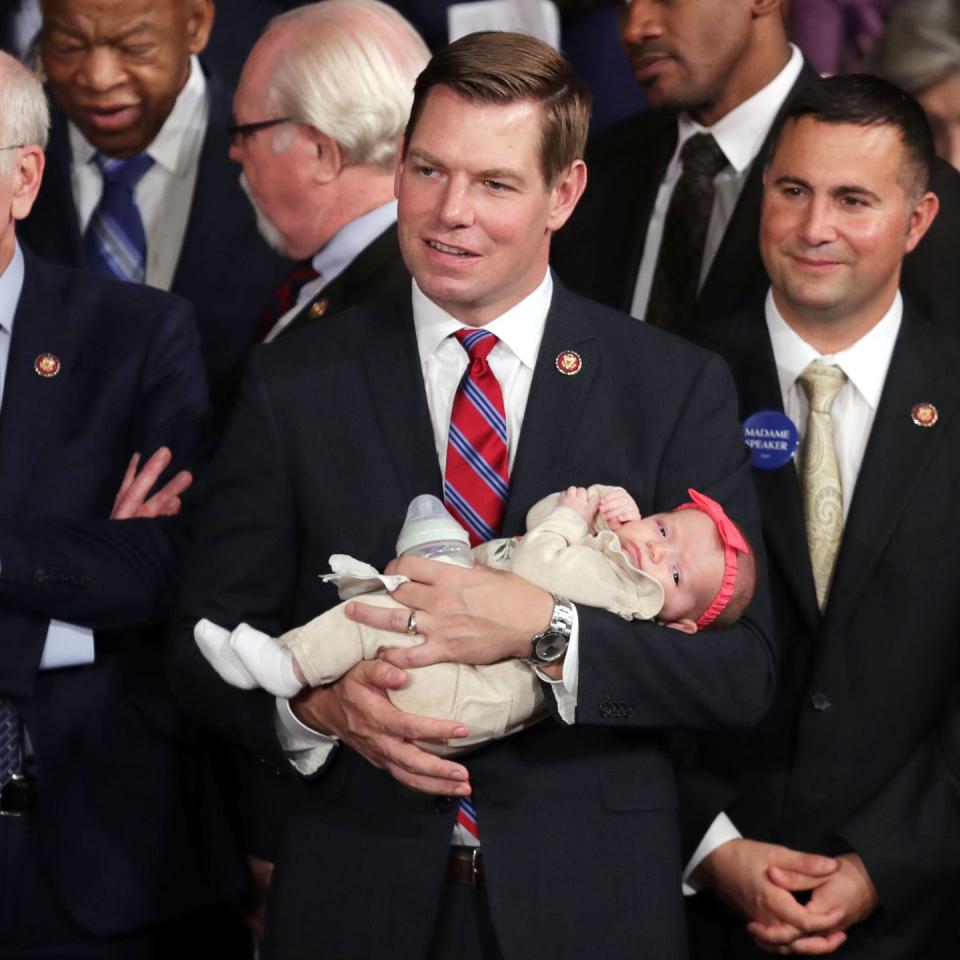
And tried to talk you out of it. So what do they think about you running for President?
[Laughs.] It's a parent's job to worry, about their kids. And my dad didn't want me to transfer from Campbell University, a small school where I was the men's campus president, and on the Division I soccer team, to go to a much larger school, the University of Maryland, where I wanted to be closer to Capitol Hill. They felt the same way about running for Congress. They don't want to see me fail. And I just tell them that actually in the way that they've lived their life and raised me, they've put me in the best possible position to succeed.
And so you have their blessing for this run?
They're very nervous, but they're proud of their son. My parents worked very hard. We moved [from Iowa to Northern Californa] and lived in eleven different houses. I went to nine different schools before graduating high school and my dad had said a couple weeks ago to me, "Son, I wish you wouldn't talk about that so much. People don't need to know that." And I said, "Dad, that makes me who I am. That's why I care about the issues I care about because I saw you weren't moving us around to punish me and make me lose friends, go to new schools. You were doing it to put me in a better school district, giving me a better shot at being able to be the first in the family to go to college." And so that is where I get my work ethic and also my belief that the promise of this country is that if you work hard, you do better.
So he's gonna be pissed when he reads this. [Laughs.]
('You Might Also Like',)

